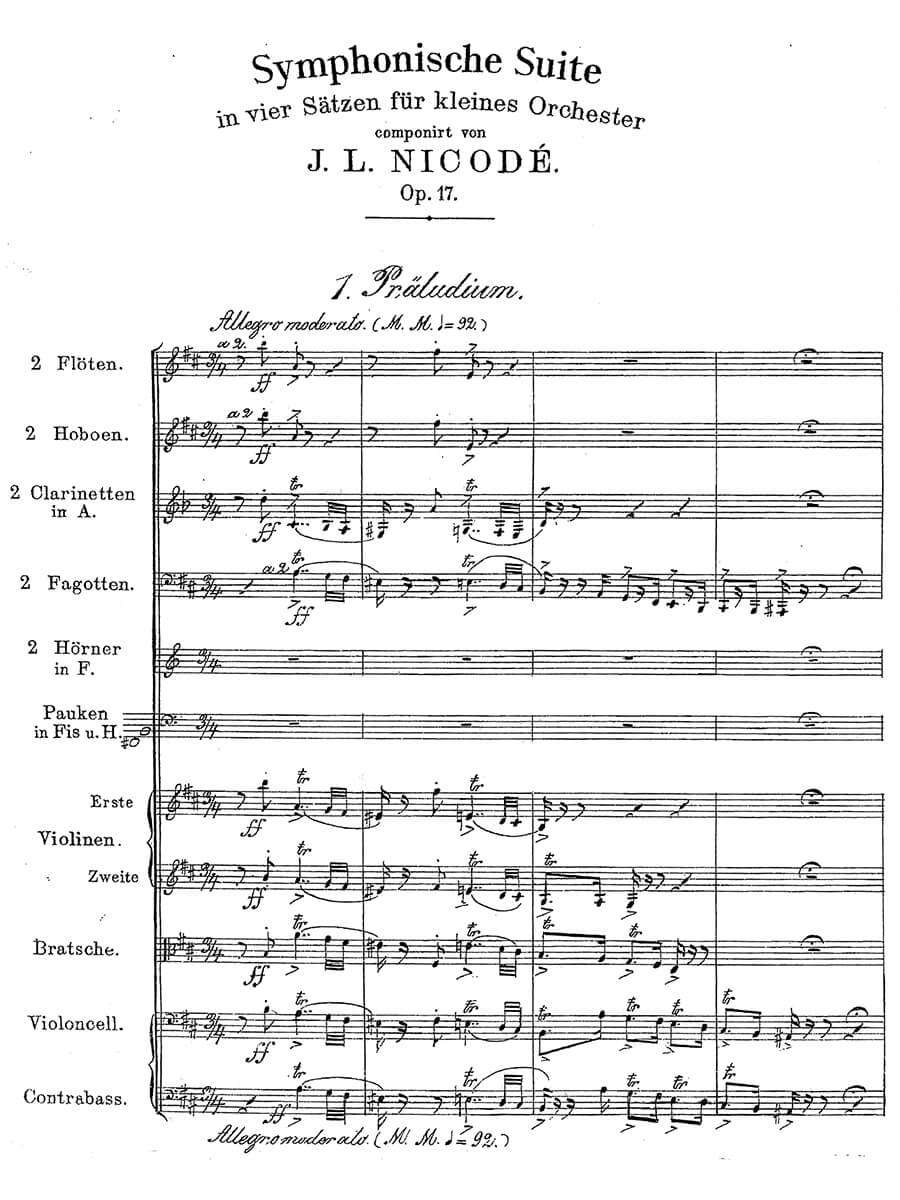Symphonic Suite in B Minor for small orchestra Op. 17
Nicodé, Jean Louis
28,00 €
Jean Louis Nicodé – Symphonic Suite in B Minor for small orchestra Op. 17 (1886)
(b. Jezyce near Poznan [Jersitz near Posen], 12 August 1853 – d. Langebrück [Dresden], 14 October 1919)
I Präludium. Allegro moderato (p. 1) – Poco vivace (p. 8) – Tempo primo (p. 17)
II Scherzo. Very lively (p. 21) – More lively (p. 29) – Trio. L’istesso tempo (p. 30) – Tempo primo (p. 36) – Fast (p. 38)
III Theme with variations (To the good spirits of Beethoven). Andante (p. 39) – Var. 1. A bit more fluent (p. 41) – Var. 2. Light and friendly, in Scherzo character (p. 44) – Var. 3. In Minuet tempo (p. 46) – Var. 4. In Funeral March tempo (p. 50) – Var. 5. Adagio non troppo (p. 53) – Allegro non troppo (p. 57) – Tranquillo, un poco (p. 58) – Tempo del Tema (p. 59)
IV Rondo. Allegro ma non troppo (p. 64) – Slower (p. 90)
Preface
Like August Klughardt, Philipp Scharwenka, HansKoessler or Engelbert Humperdinck, Jean Louis Nicodé was one of the most significant German composers of the generation between Johannes Brahms and Richard Strauss. His father was of French-Huguenot, his mother of Polish descent. In the third year after his birth the family moved to Berlin after the father had lost his property “by misadventure“. First he got some music lessons by his father. Then was taught privately by the organist Hartkaes. In 1869 he began studying at the ’Neue Akademie der Tonkunst’ that had been founded by Theodor Kullak (1818-82) in 1855. Director Kullak was his piano teacher, the Mendelssohn pupil Richard Wüerst (1824-81) and later on Friedrich Kiel (1821-85) were his composition teachers. After finishing his academic training Nicodé first became well-known as a pianist, and in 1878 he was appointed piano teacher at the Royel Conservatory in Dresden one year after Franz Wüllner (1832-1902) had been appointed the institute’s director. In 1884 Wüllner became director of the Cologne Conservatory, and Nicodé followed him there after the Dresden directorate had prevented him from programming a four-hands arrangement of Franz Liszt’s ’Faust Symphony’. But then he was offered the direction of the Philharmonic Concerts in Dresden. He strongly supported the cause of the ’Neudeutsche’ (New-German school), met with massive hostility, and vacated his position in 1888. …
Read full preface / Das ganze Vorwort lesen> HERE
| Score No. | 4700 |
|---|---|
| Edition | Repertoire Explorer |
| Genre | Orchestra |
| Printing | Reprint |
| Pages | 97 |
